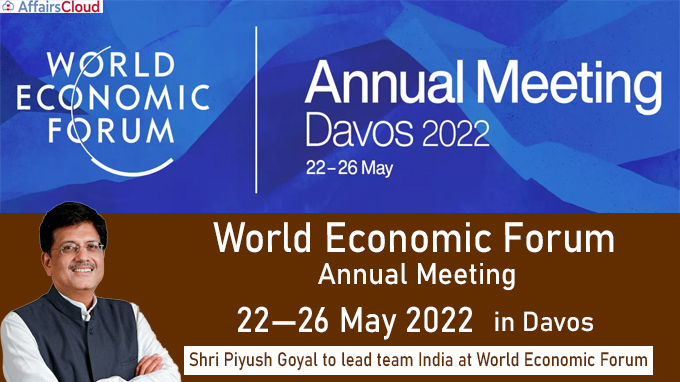
On 22-26, May 2022, the 52nd Annual World Economic Forum (WEF) Annual Meeting was held in Davos-Klosters, Graubunden, Switzerland on the theme ‘Working Together, Restoring Trust’. Originally, it was scheduled on January 17-21, 2022, but due to uncertainty over the outbreak of the Omicron variant, it was postponed.
- It brought together the foremost business, government and civil society leaders in nearly 450 sessions.
- Now, this Annual Meeting 2022 is the first global in-person leadership event since the start of the pandemic.
- It addresses the theme of “History at a Turning Point: Government Policies and Business Strategies”.
Aim:
To address economic, environmental, political and social fault-lines exacerbated by the COVID-19 pandemic.
Focus Areas:
i.Progressing cooperation on tackling climate change
ii.Building a better future for work; accelerating stakeholder capitalism
iii.Harnessing the technologies of the Fourth Industrial Revolution
iv.Ensuring a more inclusive future of work
India’s Participation:
Union Minister Piyush Goyal led team India at WEF 2022
Union Minister Piyush Goyal, Ministry of Commerce & Industry, led the delegation of Ministers, Chief Ministers (CMs) and business leaders at the WEF from May 23-25, 2022.
- It included Union Minister Mansukh Mandaviya, Ministry of Health and Family Welfare (MoH&FW), Union Minister Hardeep Singh Puri, Ministry of Petroleum and Natural Gas (MoPNG) besides CMs and other senior ministers of six states including Madhya Pradesh (MP), Tamil Nadu (TN), Andhra Pradesh (AP), Maharashtra, Karnataka and Telangana along with senior officials.
- The sessions focusing on India at WEF included ‘Strategic Outlook on India’; and ‘India’s energy transition’.
Key Points:
i.The year 2022 coincides with the WEF’s 50th anniversary and 35 years of the Forum’s collaboration with India.
ii.The platform provided opportunity to project India as an attractive investment destination amid its robust economic growth and stable macroeconomic indicators.
iii.To mark 75 years of Independence and ‘Azaadi ka Amrit Mahotsav’, Department for Promotion of Industry and Internal Trade (DPIIT) set up consolidated marquee India presence at WEF. Alongside the India Lounge, a state lounge has also been set up.
iv.Sessions are being organised at the India lounge which includes the key topics viz. policy and ease of doing business reforms, energy transition, digital economy, opportunities in National Monetization Pipeline, startups, growing talents in the digital space, emphasis on innovation and research in the healthcare ecosystem.
v.India assumes the presidency of the G-20 in 2023.
India on top for trust in domestic companies: Study
In accordance with the ‘Edelman Trust Barometer Special Report: The Geopolitical Business’, Indian companies (89%, with a gain of 4% since January 2022) have emerged as the most trusted by the domestic population, followed by China, Canada, the United States (US) and the United Kingdom (UK).
- The report was released on the sidelines of the WEF Meeting.
Key Points:
i.On the overall trust index, taking into account trust in NGOs (Non-Governmental Organizations), business, government and media, India is now placed at the 2nd place after China, as against 3rd in January 2022.
ii.Globally, scientists have emerged the most trusted category, while the United Nations (UN) is the only trusted global institution.
iii.The survey was conducted in 14 countries with 14,000 respondents between April and May.
India joins US-led coalition to clean up carbon-intensive industry
India has joined the US-led First Movers Coalition, a flagship Public-Private Partnership (PPP) to clean up the most carbon-intensive industry sectors, from heavy industry to long distance transport.
- Boston Consulting Group (also the First Movers Coalition Knowledge Partner) committed to removing 100,000 tonnes of carbon.
- The coalition announced a major expansion to more than 50 corporate members worth about $8.5 trillion and a total of 9 leading governments, covering over 40% of global GDP (Gross Domestic Product) viz. US, India, Japan, Sweden, Denmark, Italy, Norway, Singapore and the UK.
- The coalition also announced two new target sectors: carbon dioxide removal and aluminium, which join the four existing sectoral pledges (aviation, shipping, steel and trucking) launched at COP26.
- These government partners will invite companies from their countries to join the coalition and will pursue public policies to commercialize the green technologies corporate members commit to purchasing.
- The announcement for the same was made by US Special Presidential Envoy for Climate John Kerry, alongside Bill Gates, founder of Breakthrough Energy.
About First Movers Coalition:
Led by the WEF and the US government, the First Movers Coalition targets sectors including aluminium, aviation, chemicals, concrete, shipping, steel and trucking, which are responsible for 30% of global emissions.
- This proportion expected to rise to over 50% by mid-century without urgent progress on clean technology innovations.
Investing in skills of future can add $8.3 trillion to global economy: WEF
As per the WEF, increasing investments in the future skills for the next-generation workforce can add USD 8.3 trillion in increased productivity to the global economy by 2030.
- The Reskilling Revolution initiative, a coalition of 50 CEOs, 25 ministers and 350 organizations are committed for the same for their economies, societies and organizations.
Key points:
i.The Reskilling Revolution initiative, launched at the WEF’s 50th Annual Meeting in January 2020, is working to provide 1 billion people with better education, skills and economic opportunity by 2030.
ii.It works together with 12 countries — Bahrain, Bangladesh, Brazil, Cambodia, Georgia, Greece, India, Oman, Pakistan, South Africa, Turkey and the United Arab Emirates (UAE), with knowledge support from Denmark, Finland, Singapore and Switzerland.
iii.These efforts are being taken forward by a new Education 4.0 Alliance, bringing together 20 leading education organisations at the Forum’s Annual Meeting 2022,
iv.A new report prepared under this project showed that investment in the skills of the future for primary and secondary school learners would create an additional USD 489 billion in Europe, USD 458 billion in South Asia, USD 333 billion in East Asia, USD 332 billion in Latin America, USD 266 billion in the Middle East, USD 235 billion in North America, USD 179 billion in sub-Saharan Africa, and USD 163 billion in Central Asia.
4 new Industrial Clusters join WEF’s Net-Zero Transition Initiative
WEF’s ‘Transitioning Industrial Clusters towards Net-Zero’ initiative will be joined by four more industrial clusters the Netherlands, Belgium and the US viz. Brightlands Circular Space (Geleen, Netherlands); H2Houston Hub (Houston, US); Ohio Clean Hydrogen Hub Alliance (Ohio, US); Port of Antwerp-Bruges (Belgium, Europe)
Key Points:
i.The initiative will enable these hubs to accelerate industrial decarbonization, boost job creation and improve competitiveness.
ii.Launched at COP26 in November 2021, the initiative aims to accelerate the decarbonization of hard-to-abate industrial sectors, while maximizing job creation and economic competitiveness.
iii.Under this initiative, WEF works closely with Accenture and the Electric Power Research Institute (EPRI) as knowledge partners, c
WEF launches alliance to Supercharge India’s climate action
WEF has launched the India chapter of the Alliance of CEO Climate Action Leaders to supercharge India’s climate action and decarbonization efforts, as a part of WEF’s Climate Action Platform.
- The alliance is the collaboration between management consultancy Kearney and the Indian think-tank Observer Research Foundation.
Key Points:
i.The alliance will continue efforts to achieve the vision outlined in the white paper released in 2021, ‘Mission 2070: A Green New Deal for a Net Zero India’, on India’s low-carbon transition by 2070.
ii.It will serve as a high-level platform to bring together the government, businesses, and other key stakeholders to achieve Prime Minister Narendra Modi’s ambitious ‘Panchamrit’ pledge, which includes the country’s net-zero target by 2070.
DCO, WEF launch initiative to boost global digital FDI flows
The Digital Cooperation Organization (DCO) and WEF signed an agreement to launch a new initiative to boost flows of digital foreign direct investments globally. Both entities will work together to identify methods to increase digital adoption, investment in new digital activities, and investment in digital infrastructure.
- They will also launch Digital FDI (Foreign Direct Investment) Enabling Projects in countries around the world, helping them identify and support implementation of policies and measures to increase investment in the digital economy.
- The DCO, which focuses on digital economy initiatives supporting youth, startup entrepreneurs and women, has nine member states with a combined GDP of nearly USD 2 trillion and a population of nearly 600 million.
Swiss Digital Initiative takes Digital Trust Label global
The Swiss Digital Initiative launched in January 2022 has taken WEF’s Digital Trust Label to the international level. The Label has been awarded to five Swiss companies and their digital services and 14 more have committed to get the Label in 2022.
- UNICEF Switzerland and Liechtenstein has become the first non-profit organisation, for online donation process with the Label.
- With the customer app of the German company wefox, the Digital Trust Label will – for the first time – be awarded outside of Switzerland, Swiss Digital Initiative (SDI).
WEF launches Global Collaboration Village for strong public-private cooperation
WEF is building a ‘Global Collaboration Village’ as the virtual future of public-private cooperation, in collaboration with Accenture and Microsoft.
- The Global Collaboration Village will be an extension of the WEF’s public private platforms and in-person meetings and will provide a more open, more sustained and more comprehensive process for coming together.
Key aims of the Global Collaboration Village
i.Global cooperation: To create a new virtual space where global interaction can be enhanced.
ii.Interactivity: To provide immersive experiences to foster a better understanding of key global challenges.
iii.Inclusivity: To offer a collaborative public space for discussions about pressing global issues.
iv.Impact: The platform and all of its goals are geared towards catalysing more effective individual and collective action
Initiative: Defining and Building the Metaverse
WEF also launches a new initiative on Defining and Building the Metaverse, which convenes more than 60 leading companies from technology and other sectors alongside experts from governments, academia and civil society.
About World Economic Forum (WEF):
Founder and Executive Chairman– Klaus Schwab
Headquarter – Geneva, Switzerland




